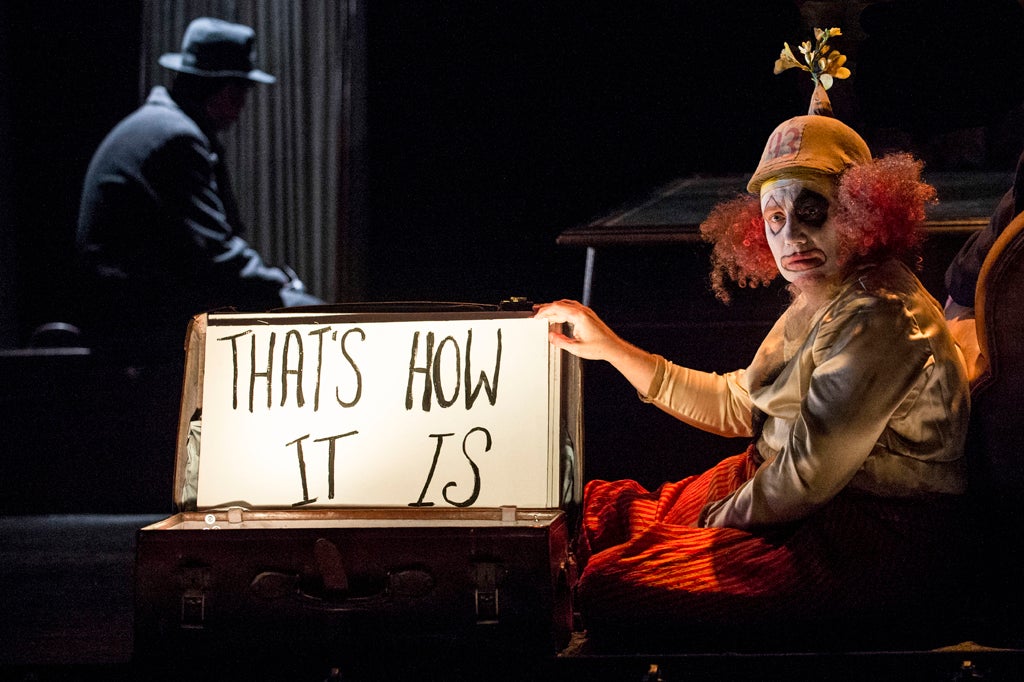The Emperor of Atlantis/Christ lag in Todesbanden, English Touring Opera, Linbury Studio, London

Your support helps us to tell the story
From reproductive rights to climate change to Big Tech, The Independent is on the ground when the story is developing. Whether it's investigating the financials of Elon Musk's pro-Trump PAC or producing our latest documentary, 'The A Word', which shines a light on the American women fighting for reproductive rights, we know how important it is to parse out the facts from the messaging.
At such a critical moment in US history, we need reporters on the ground. Your donation allows us to keep sending journalists to speak to both sides of the story.
The Independent is trusted by Americans across the entire political spectrum. And unlike many other quality news outlets, we choose not to lock Americans out of our reporting and analysis with paywalls. We believe quality journalism should be available to everyone, paid for by those who can afford it.
Your support makes all the difference.Strange: you go to hear an opera composed in a concentration camp, and it’s Bach who moves you to tears. Terezin was the Nazis’ show prison, where the Czech Jewish intelligentsia was allowed to pursue its cultural activities prior to being trucked off to Auschwitz.
This was where Europe’s ‘lost generation’ of composers ended up, and the august Viktor Ullmann was their spokesman. "We did not sit weeping by the waters of Babylon," he wrote. "Our will to create was commensurate with our will to live." His opera Der Kaiser von Atlantis was stopped in rehearsals when the Nazis registered its satirical intent, but its score survived, allowing us to marvel that a work of such subtly nuanced beauty could emerge from such a hell-on-earth.
Director James Conway wisely decided not to pair this short masterpiece with another; taking his cue from the Bach chorale in the final scene, he prefaces the opera with a performance of Bach’s Passion cantata Christ lag in Todesbanden, whose message of Life triumphing over Death mirrors the message of Ullmann and his young librettist Peter Kien. Thus it is that the lights go up on a rudimentary little set topped with the infamous legend Arbeit Macht Frei, and on four figures dressed for a long, cold journey.
It’s not just the piercing beauty of their singing which is unbearably sad: it’s the sense we have that we are in Terezin, that this is exactly how it must have been.
And when, joined by three more singers, they move into character, the spell continues unbroken. Scythe-waving Death goes on strike, to the dismay of the Emperor whose aim is to kill everyone; Love blossoms between a girl and the soldier tasked with shooting her; finally, with a profoundly poetic rumination, the Emperor himself opts to die, thus setting the world free.
In this production the final tableau comes as a shock, as the original quartet reappears to sing Ullmann’s delicately skewed version of one of Bach’s most consoling chorales. But now they are stripped naked, huddled together in their defencelessness. We are back where we started, and the gas chamber beckons.
Conductor Peter Selwyn and his ensemble effortlessly bridge the gulf between Baroque grace and Ullmann’s blend of cabaret and Berg-influenced modernism; the cast performs heroically.
Join our commenting forum
Join thought-provoking conversations, follow other Independent readers and see their replies
Comments